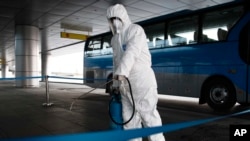The U.N. Sanctions Committee said it is ready to consider exemptions that would allow aid to North Korea to help the country battle the fast-spreading coronavirus.
"The Committee stands ready to consider as expeditiously as possible any requests for exemptions related to the prevention and/or treatment of the coronavirus, should the need arise," officials with the U.N. 1718 Sanctions Committee on North Korea said in an email statement sent to VOA's Korean Service.
Sanctions that the U.N. Security Council has placed on North Korea since 2006 to curb its nuclear weapons program currently restrict goods from flowing freely in and out of country, but the U.N. has been granting exemptions as needed for humanitarian organizations to provide aid to the country since then.
Phil Robertson, deputy director of the Asia Division for Human Rights Watch, said aid organizations cannot operate in North Korea to help it contain and treat the deadly virus "without the permission of the government."
North Korea has not asked for help from any outside organization as it stepped up its efforts to contain the virus from entering the country.
There are no official reports of confirmed coronavirus cases in North Korea.
But the Daily NK website reported on Monday that a woman in Pyongyang died in January from "acute pneumonia," exhibiting symptoms similar to that of the coronavirus infection. In a separate report Friday, it cited that several people died after suffering from fever in Sinuiju, a city that borders on China.
The fatal infectious disease was first reported on Dec. 31 in the Chinese city of Wuhan and has spread quickly around the world.
It is unclear whether the deaths in North Korea are related to the coronavirus and whether Pyongyang will confirm cases and deaths. The regime is known to hide deaths related to contagious diseases.
Former North Korean doctor Choi Jung-hoon, who defected to South Korea in 2012, told VOA that "the regime is reluctant to announce any outbreak publicly" because "North Korea tries to put up an image of having the best 'self-sufficient' medical science to treat and prevent infectious diseases through propaganda."
Choi, now a professor at Korea University's Public Policy Research Institute in Seoul, thinks there could be an outbreak in North Korea because "it is impossible to have closed off all roads connecting to China."
North Korea shares a border with China. Trucks and people crossed the border daily before the virus broke out. Pyongyang closed the border on Jan. 22, and suspended all air and train routes to China on Jan. 31.
North Korea's official newspaper Rodong Sinmun reported Monday that medical workers in Sinuiju are "performing their responsibility in hygienic information service and quarantine work to curb the infectious disease."
The paper also reported that the Sariwon Hygienic and Anti-Epidemic Station "produces disinfectant by itself and supplies it to factories, enterprises and neighborhood units in a responsible manner so as to prevent the novel coronavirus infection." Sariwon is a city south of Pyongyang.
During the SARS epidemic in 2002 and 2003, North Korea allowed international relief into the country to help fight the fatal virus.
On Saturday, it appears North Korea canceled a scheduled large-scale parade to celebrate the 72nd anniversary of the Korean People's Army.
The country's state Korean Central News Agency (KCNA) on Sunday only mentioned that soldiers laid a bouquet of flowers before the statutes of former leaders of North Korea, Kim Il Sung and Kim Jong Il, the grandfather and father of current leader Kim Jong Il, in Mansu Hill, to commemorate the anniversary.
Usually, North Korea commemorates its founding anniversary with big parades showcasing its military prowess.
In 2018, the country displayed its military weapons, as thousands of people gathered in Pyongyang to celebrate the 70th anniversary. In 2019, North Korea did not hold a military parade due to denuclearization talks with the U.S. — talks that remain largely stalled since the abrupt end of the working-level talks held in Stockholm in October.
Also amid growing concern about the virus, Kim has not been seen publicly for over two weeks. He was last seen in public attending the Lunar New Year's performance on Jan. 25.
Christy Lee contributed to this story, which originated on VOA's Korean Service.








